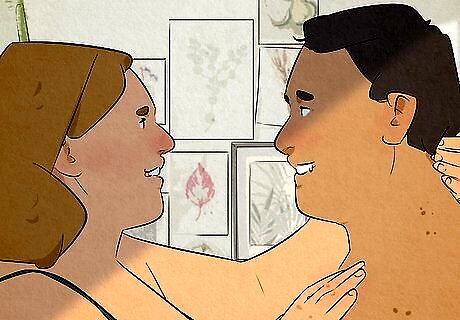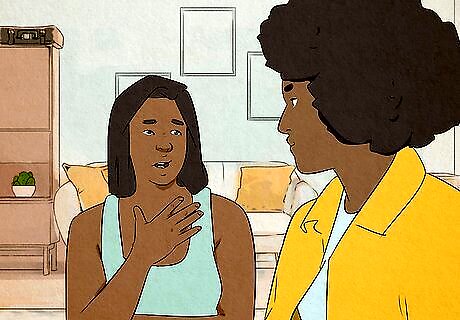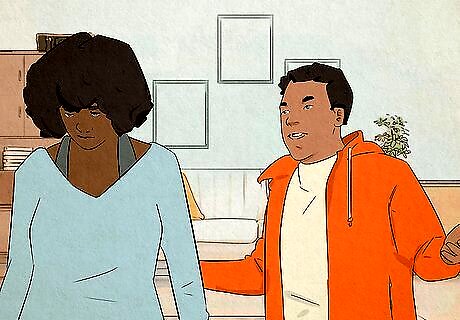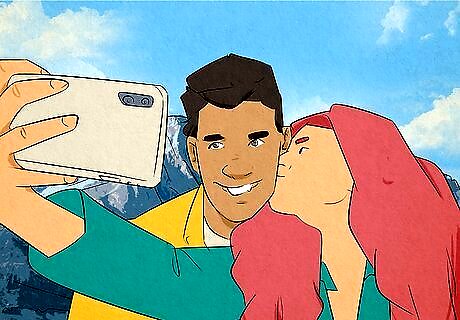
views
- Tell them you love them back if you're sure you feel the same way: "I love you, too. You make me so happy."
- Explain that you need more time to think if you're unsure: "I need to take a couple days to reflect. Is that okay?"
- If you both say "I love you" for the first time, do something special to celebrate. For example, you might take a teary-eyed, sappy photo to frame later.
What to Say (or Do)

Ask for a second to reflect if you need it. It's totally possible that when they share their feelings, you won't have your response prepared. Maybe their confession is a total surprise, and in that case, it might make sense to take a beat and gather your thoughts. Do you love them back? Could you ever imagine loving them? Think about how you felt when they said "I love you": were you happy or anxious? If you need just a couple minutes to think, say: "Wow, thank you so much for sharing that. I need a second to gather my thoughts, then I'll give you a full response." If you think you'll need a couple days, say so: "I'm so grateful that you told me how you feel. I want to say the right thing, and I think I need time to think. Is that okay?"

Say “I love you” back to the person if you're sure that you mean it. If you love this person back, then that's amazing! In that case, you can gleefully reciprocate those deep feelings, and potentially transition to a super exciting, more serious stage in your romance. It goes without saying that responding with "I love you" when you don't mean it will complicate your relationship (and maybe hurt it down the line, too). If your under the influence of drugs or alcohol (or you're uncertain) it's better to wait. "I love you too, Cole." Saying the person's name, holding eye contact, and even grabbing their hand can make the moment feel even more romantic. Tell them how their confession makes you feel: "I can't imagine anything making me happier than what you just told me. I love you, too." Explain what their love means to you: "Your love makes me a better person. I love you, too." Give them an idea of how much you love them: "I love you, too. I've never felt this way about anyone and I couldn't imagine loving anyone more." If you want, make a sweet joke, too: "I'm sorry, could you say that again? Or 100 more times? I love you too, duh."

Tell them directly if you're not ready to say "I love you." If you don't feel ready to say it back, that's totally okay (and no matter what happens, it's best to be honest with the people you care about). Depending on how you view your relationship with this person, you might want to include a few other details. For instance, you might: Tell them that you need more time: "I'm so glad you shared that with me, thank you. To be honest, I think I'll need some time before I get there." Say that you think you'll feel that way soon: "Wow. I think I'm close to feeling that way. I could imagine getting there soon, but I'm not there yet. Is that okay?" Explain why "I love you" is hard for you to say: "I have a really hard time saying 'I love you' because I've been burned in the past. I think I'll need more time." Let them know that you probably won't feel that way: "I really care about you, but to be honest, I'm not looking for anything serious right now." Tell them what you like about them to ease the blow: "I don't feel that way just yet, but I think you're such a special, smart, amazing person."

Give them a hug or a kiss if you want to. Providing a token of affection for the person is another great way to respond. You hug or kiss the person instead of responding with words. You can also add a hug or kiss if you said “I love you” back, or if you told them you don’t feel ready to say “I love you” yet. Just don’t hug or kiss the person if you are thinking of breaking up with them. This will send mixed signals, which can cause the person distress once they learn the truth. For example, if you’ve just said “I love you, too,” then lean in for a hug or a kiss. If you’ve just told the person that you’re not ready to say “I love you” yet and let them know that you value them and enjoy their company, you might offer a hug as a way to show you’re sincere. If you’ve just told the person that you are not interested in continuing the relationship, then giving a hug or a kiss is not a good idea. However, you might reassure them with a less intimate physical gesture, such as a pat on the arm or back.
Navigating a Relationship after "I Love You"

Expect some disappointment if you don’t say “I love you" back. The other person might look embarrassed, sad, stressed, or disappointed. This is super normal, and though it's tough to see someone else feeling down, don't feel pressured to say what they want to hear just to ease their pain. Instead, if you feel bad, share other positive things that you genuinely feel or try to offer them some comfort: Share your gratitude: "I am so happy that you shared that with me. I'm grateful for your honesty." Tell them what you like about them: "I think you're an incredible person, and the fact that my feelings move slowly is about me, not you." Ask them what they want from you: "What do you need from me? We can keep talking, or I can give you some space. I'm totally here for you." Suggest they take time to themselves: "Should I leave you alone for a few minutes? I might go grab a glass of water, then you can tell me when I can return."

Leave immediately if they express anger or make you uncomfortable. Sadness and disappointment are normal, but if this person is enraged, that's not okay. You don't own anyone romantic feelings of love, and if they don't understand that, then that's on them. And if someone acts like you do, that's emotional manipulation.If someone raises your alarm, yells, throws things, or acts abusively, leave immediately. Go spend time with someone you love and trust. You don't deserve to be treated this way. Reach out to someone who makes you feel safe. If the person who said "I love you" left you feeling unsafe, consider cutting off contact. If they try to guilt you, remember that your wellbeing should be your #1 priority.

Remind yourself that people move at different paces in love. If your partner knows that they love you, that's great. If you're not sure yet, that's totally okay, too. Try to avoid feelings of guilt by reminding yourself that there's no "right" or "wrong" timeline in love. Pay close attention to your thoughts—you might find yourself saying unfair things to you that you wouldn't say to a friend. If you notice that, challenge them! It's okay that I'm taking longer than my partner took. Everybody falls in love at different speeds. The most important thing is that I'm honest. If your partner accuses you of taking too long, remind them of the same thing. "I can't control how I feel and there's no perfect timeline for love. I can promise you that I'll be honest, but I also need you to respect me enough to be patient."

Do something fun, romantic, and memorable if you both reciprocated. Did you two both share that you're in love with each other? How exciting! Sounds like now's the time to go mark the occasion, because this is a super special moment. Go with whatever feels the most exciting to both of you. Here are a few fun ideas: Carve your initials into a tree. Take a photo together to remember the moment. Go celebrate with a fancy dinner and champagne. Visit the place where you both first met. Write each other a letter about how you both feel now to read on your anniversary. You probably feel like the other person's company is all that you need. You can also just spend the day wrapped up in each other's arms. So romantic!

















Comments
0 comment